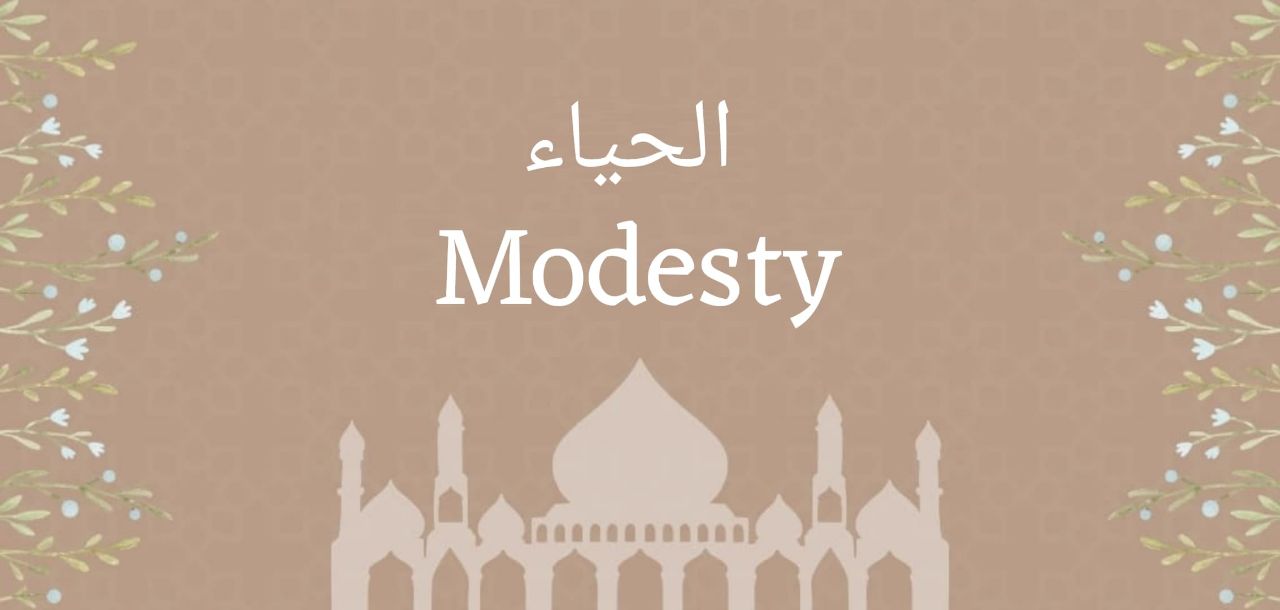The prophet Muhammad was sent to perfect good character, and Allah Almighty distinguishes the religion of Islam with Ḥayā (modesty). It was narrated from Anas that the Messenger of Allah (ﷺ) said: “Every religion has its distinct characteristic, and the distinct characteristic of Islam is modesty.” Ḥayā (modesty) is a quality that leads the soul to practice good deeds and abandon evil deeds. The Arabic word for modesty is Ḥayā, this word covers different meanings and characteristic, such as shame, modesty, bashfulness, and any quality that behaves the soul, mind, and body. Ibn al-Qayyim, an early scholar of Islam, wrote:
”Ḥayāʾ is of the most superior qualities, of the greatest in status, and of the most beneficial. Indeed, it is quintessential to humanness, for whoever carries no Hayāʾ has no share of humanness other than flesh, blood, and outward appearance. Likewise, there is no potential for good in a person [without it]. Were it not for this quality, he would never be hospitable to a guest, keep a promise, fulfill a trust, take care of anyone’s needs, prefer what is pleasant, avoid the obscene, cover his private parts, or abstain from fornication. Were it not for Hayāʾ, many people would not have fulfilled any of their obligations, nor acknowledged the rights of any being, nor kept the ties of kin, nor even shown kindness to parents.”
The prophet Muhammad (ﷺ) made modesty a way of life, and a rule for measuring goodness and evil. Thus, any attempting to be characterized by modesty is a worship for Allah, as the prophet Muhammad (ﷺ) “Iman has sixty odd or seventy odd branches. The uppermost of all these is the Testimony of Faith: ‘La ilaha illallah’ (there is no true god except Allah) while the least of them is the removal of harmful object from the road. And shyness is a branch of Iman.” Ḥayā does not bring anything except good, and it is all about goodness. If Ḥayā is removed from a muslim, then people can expect all sorts of evil, the prophet Muhammad warned us about the consequences of being someone who is not controlled by Ḥayā, he said “One of the things people have learned from the words of the earliest prophecies is, “If you don’t feel any shame, do whatever you like.” Also, this Hadith contains another meaning beside its warnings, it sent a threaten to the believers that all of actions will be judged and Allah is watching all your actions, no matter what you did in public or private, He said in Surah Fussilat, Ayah ”Do whatever you will; indeed, He is Seeing of what you do.” (اعْمَلُوا مَا شِئْتُمْ ۖ إِنَّهُ بِمَا تَعْمَلُونَ بَصِيرٌ).
There are different forms of Ḥayā:
1- Ḥayā from Allah. This is the greatest form of Ḥayā, is the fear of being seen by Allah in a position of sinning. The prophet Muhammad said (ﷺ) said, “Ihsan is to worship Allah as if you see Him, and if you do not achieve this state of devotion, then (take it for granted that) Allah sees you.” Through following the orders of Allah and avoiding its prohibitions, Muslim can achieve the Ḥayā from Allah. Ibn Mas’ud told of the prophet saying to his companions one day, “Show due respect towards God.” On their replying, “Prophet of God, we show due respect towards God, praise be to God,” he said, “That is not what I mean; but he who shows due respect to God must guard the head and what it retains, must guard the belly and what it contains, and keep death and decay in remembrance; and he who desires the next world must abandon the adornment of this world. He who does that has shown due respect towards God.”
2-Ḥayā from people. This happens through abstaining from harming people, physically or morally, ‘Abdallah b. ‘Amr reported God’s messenger as saying, “The Muslim is he from whose tongue and hand the Muslims are safe, and the Emigrant is he who abandons what God has prohibited.” Another form of feeling modesty towards people is abstaining from exposing person’s wrongdoings. Messenger of Allah (ﷺ) said, “Every one of my followers will be forgiven except those who expose (openly) their wrongdoings. An example of this is that of a man who commits a sin at night which Allah has covered for him, and in the morning, he would say (to people): “I committed such and such sin last night,’ while Allah had kept it a secret. During the night Allah has covered it up but in the morning he tears up the cover provided by Allah Himself.”
3-Ḥayā from self. This type of modesty is the characteristics of the people of honour and generosity. Modesty can prevent Muslim from doing wrongdoings that may undervalue his self resect before Allah and people.
We ask Allah for guidance, piety, self-control and a competence. May Allah fill our hearts with the fear and love for Him.



Spot on with this write-up, I truly think this web site wants far more consideration. I’ll most likely be again to learn much more, thanks for that info.